Colombian drug kingpin Pablo Escobar illegally imported four hippopotamuses for his private zoo in the 1980s, but they escaped after his death in 1993 — and now more than 150 of these "cocaine hippos" are running wild in the country's waterways.
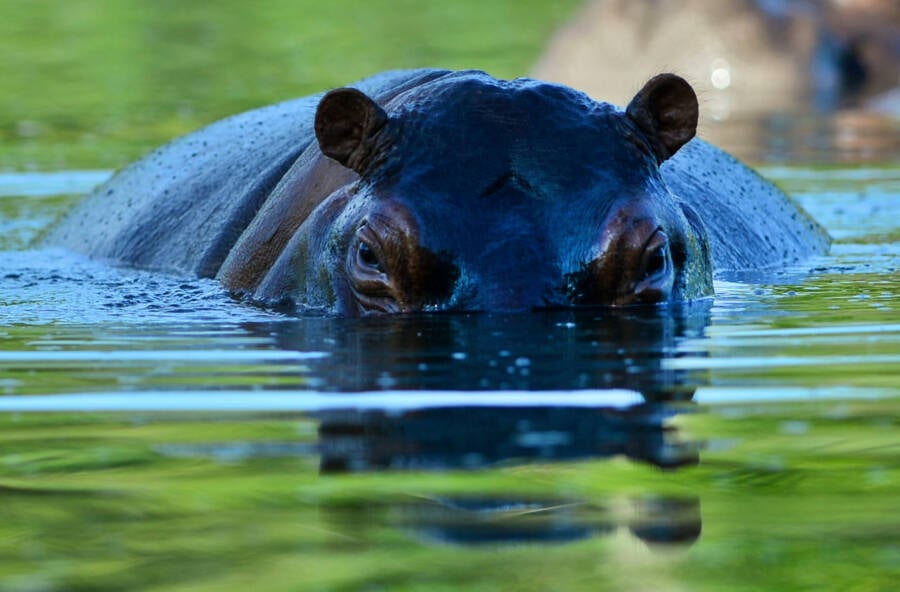
RAUL ARBOLEDA/AFP via Getty ImagesOne of Pablo Escobar’s hippos sits in the water at the Hacienda Nápoles theme park, once the private zoo of the late drug kingpin. Today, thanks to Escobar, these “cocaine hippos” in Colombia are a major problem.
It turns out that the legacy of Colombian drug lord Pablo Escobar isn’t tied exclusively to cocaine trafficking and murder. One of his most lasting marks on history might just be the four hippos he once housed in his private zoo that have since reproduced to a population of more than 150, befouling waterways in Colombia and generally disrupting the ecosystem.
According to recent research, it’s now gotten to the point that Pablo Escobar’s “cocaine hippos” in Colombia are classified as an invasive species and are on their way to numbering in the thousands.
A study published in the journal Ecology found that these massive “cocaine hippos” have been excreting their waste into the local lakes and rivers and substantially changing the oxygen levels and chemistry of the waters.
The researchers, comprising experts from the University of California, San Diego, and the Universidad Pedagógica y Tecnológica de Colombia, believe the population descended from Pablo Escobar’s hippos will only continue to increase, causing further environmental damage.
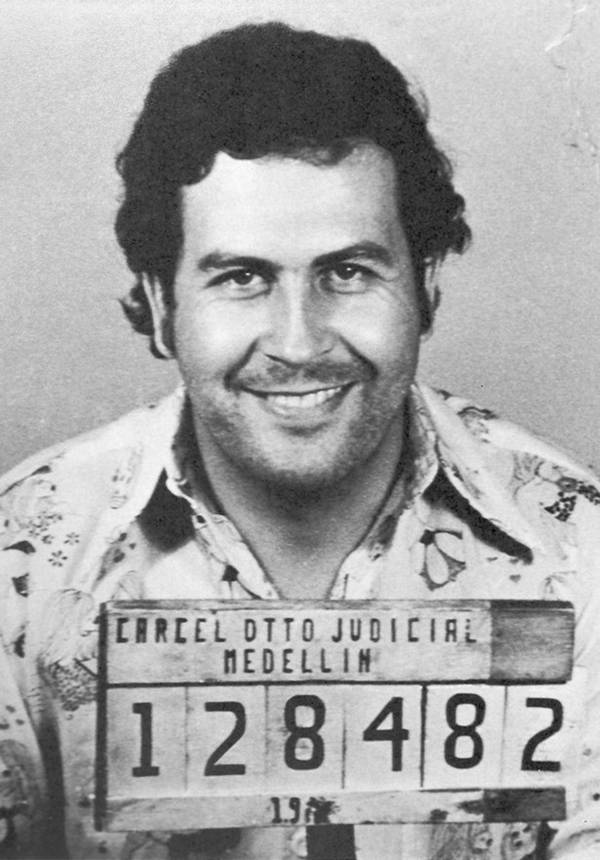
Wikimedia CommonsA 1976 mugshot of Pablo Escobar.
To address this ongoing issue, the Colombian government announced in November 2023 that it would begin the process of surgically sterilizing some 40 hippos per year as a last-ditch effort to get the population under control. They will also transfer some of the “cocaine hippos” to other countries — and even resort to euthanasia if necessary.
The Wild Story Behind Pablo Escobar’s Hippos
Running at speeds of almost 20 miles per hour on land, hippopotamuses have been known to take down anything in their path, including lions. These living tanks could be the deadliest large land mammal, killing an estimated 500 people per year in Africa.
Thankfully, barring a visit to the zoo, most people in America never need to worry about seeing and potentially being murdered by hippos. However, the same can not be said for Colombians near Escobar’s former private zoo on his estate, Hacienda Nápoles.
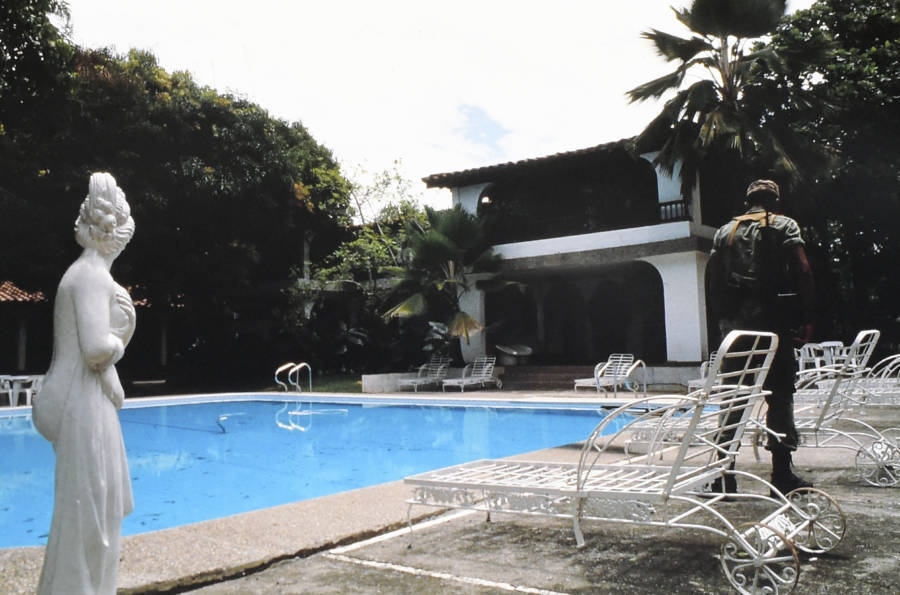
Eric VANDEVILLE/Gamma-Rapho via Getty ImagesA pool at Hacienda Nápoles, Pablo Escobar’s luxurious estate in Puerto Triunfo, Colombia.
According to the BBC, the zoo featured exotic wildlife such as elephants and giraffes to go along with the hippopotamuses. Pablo Escobar had the hippos illegally imported in the 1980s, back when he was bringing in as much as $420 million every week.
After the Colombian police shot and killed Escobar in 1993, the government took control of the animals. While some of the creatures in the zoo were transferred to facilities around the world, Pablo Escobar’s hippos were left behind, eventually escaping and reverting to a more feral state.
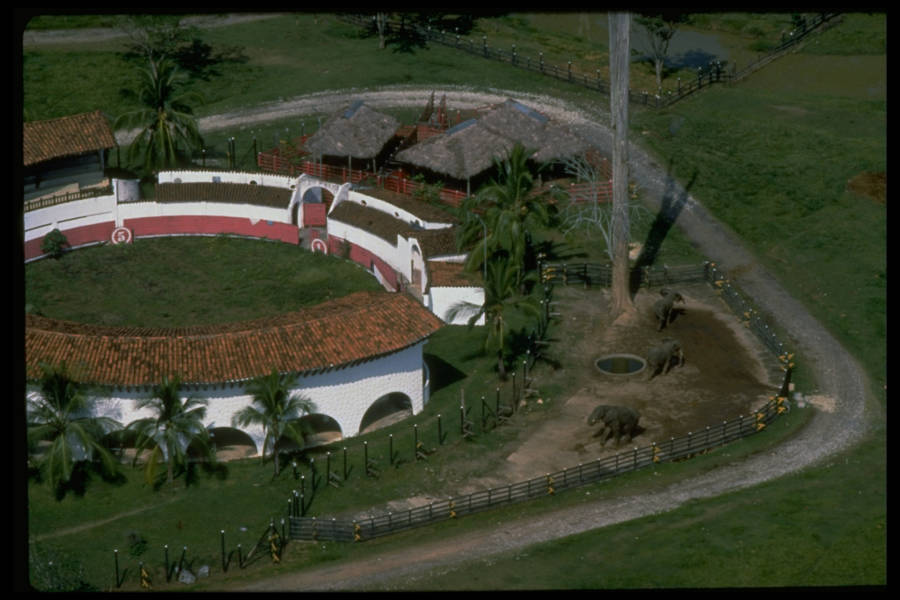
Timothy Ross/The LIFE Images Collection/Getty ImagesAn aerial photograph of Hacienda Nápoles. Pablo Escobar’s elephants are visible walking around the lower right corner.
“The fishermen, they were all saying, ‘How come there’s a hippo here?'” said conservation worker Carlos Valderrama, who once investigated claims of an animal “with small ears and a really big mouth” appearing in a river near Escobar’s estate. “We started asking around and of course they were all coming from Hacienda Nápoles. Everything happened because of the whim of a villain.”
Left to their own devices, the “cocaine hippos” thrived. The lack of natural predators cleared the way for their population growth to soar at an alarming rate.
How The “Cocaine Hippos” In Colombia Are Damaging The Ecosystem
The hippos in Colombia effectively take over whatever lake or river they come across and displace the species native to the region. An otter or a manatee stands little chance against the African behemoths — which are extremely territorial — so other creatures are simply forced out if not outright killed.
Furthermore, scientists are concerned about the possible effects the hippos’ excrement could have on the Colombian ecosystem. For example, the waste from the “cocaine hippos” adds nutrients to lakes, leading to algae blooms that kill fish.
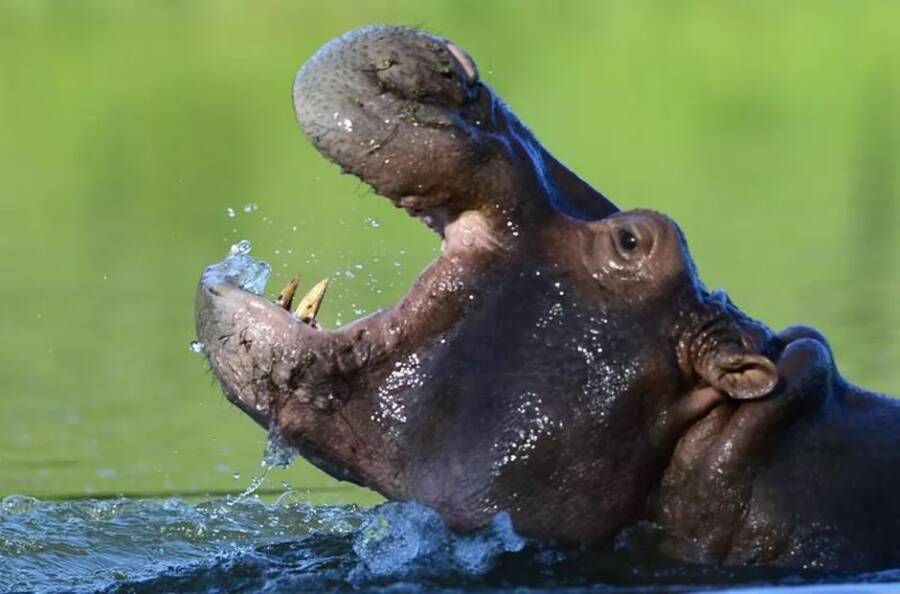
RAUL ARBOLEDA/AFP via Getty ImagesOne of Pablo Escobar’s hippos raises its head from the water at Hacienda Nápoles.
The latest study found that hippo waste helps fertilize algae and bacteria harmful to both humans and animals. The resulting algal blooms, similar to red tides, can sicken both.
Lastly, given the violent temperament of hippopotamuses and the extreme danger they present to anyone or anything they come into contact with, their populations are very difficult to manage. The outlook for the local ecosystem, then, is rather grim.
The Growing Concern Around Pablo Escobar’s “Cocaine Hippos”
All of the issues that Colombia is currently experiencing with Escobar’s hippos will only get worse in the coming years if scientists don’t do something to cull the herd. Jonathan Shurin, the lead author of the Ecology study, noted, “If you plot out their population growth, we show that it tends to go exponentially skyward.”
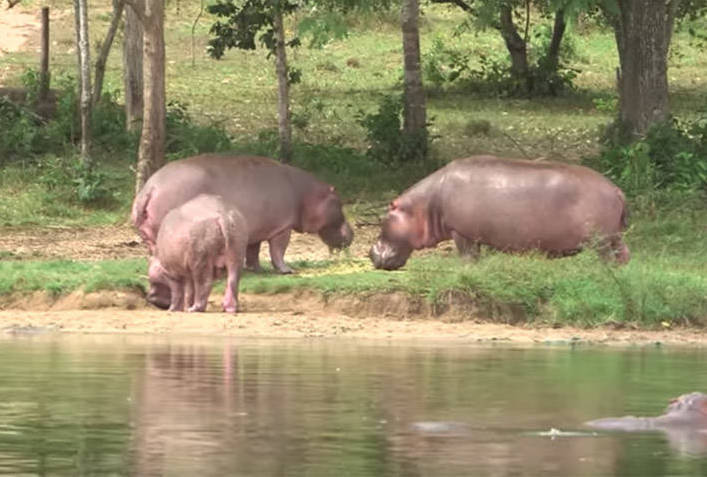
YouTubeHippos roaming alongside a Colombian lake.
“In the next couple of decades there could be thousands of them,” Shurin continued. “This study suggests that there is some urgency to deciding what to do about them. The question is: What should that be?”
The safety and livelihood of locals are also at stake thanks to the “cocaine hippos.” While no one has been slain by a hippo yet, the animals have already damaged farms in the area. Occasionally, one will make its way to the center of town and send the people into a panic.
Local and federal governments have attempted to implement various solutions to the region’s hippo problem. They tried initiating a hunting program, but nobody wanted to kill the hippos, and eating them could potentially give people diseases such as leptospirosis.
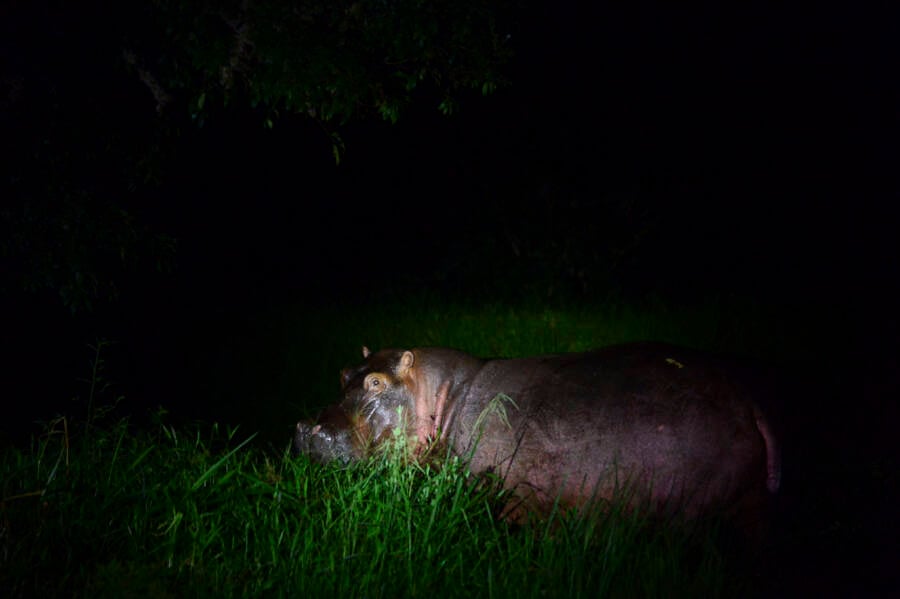
RAUL ARBOLEDA/AFP via Getty ImagesA hippo feeds at a farm on the outskirts of Doradal, Colombia, near Hacienda Nápoles.
The government also attempted to castrate the mammals, but hippos are sensitive to chemicals. That means they have to be castrated manually, which is, for obvious reasons, a challenging endeavor. To further complicate matters, as a defense mechanism, male hippos’ testicles are hidden inside their bodies.
In November 2023, however, the Colombian government devised a plan to deal with the hippo problem once and for all — but it’s going to be costly.
Colombia Begins Sterilizing Pablo Escobar’s Hippos
On Nov. 14, 2023, the Colombian government announced its plan to begin sterilizing the more than 150 hippos roaming about freely in the country’s rivers.
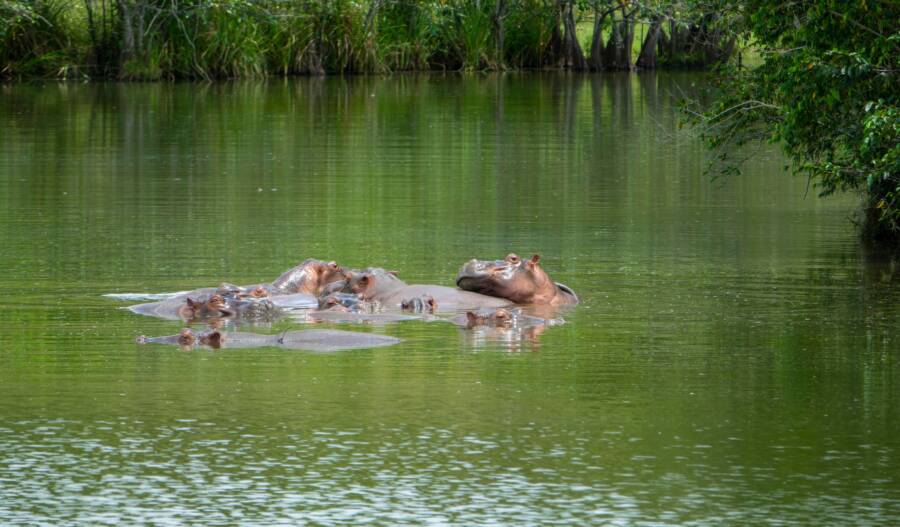
Gualberto Becerra/Alamy Stock PhotoThe Colombian government estimates that the hippo population has reached 169 — and could balloon to more than 1,000 by 2035 if left unchecked.
Of course, this process isn’t quick, cheap, or easy. So far, the Colombian government has successfully surgically sterilized two males and one female, but each individual operation costs around $9,800. Multiply that by another 166 “cocaine hippos” and you’re looking at a staggering $1,626,800.
But it would also be unrealistic to expect to sterilize every single hippopotamus in Colombia, which is why the government also plans to deport a number of the hippos — or even euthanize some. Deportation isn’t cheap either, however, and could cost as much as $3.5 million.
Still, it’s clearer than ever that something needs to be done about the “cocaine hippos.” Some experts have suggested the population could multiply at an even more rapid pace over the next decade, reaching 1,000 by 2035.
The process is complicated even further by the excess rainfall in Colombia recently, leading to an overgrowth of grass. As David Echeverry López, chief of the environment office in charge of the plan, explained to the press in a video, the extra grass means the hippos “have an oversupply of food, so baiting them to capture them becomes even more complicated.”
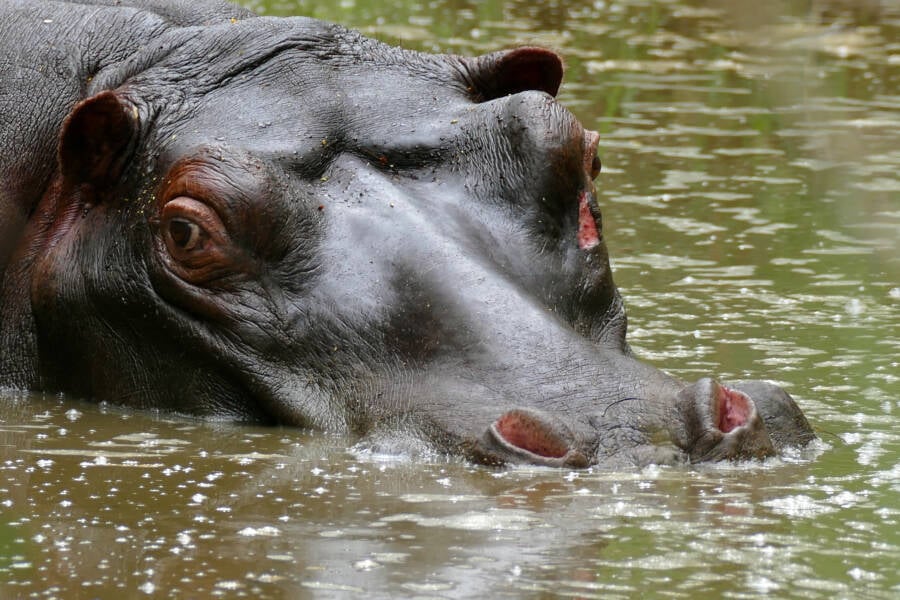
Wikimedia CommonsHippos eat a significant amount of grass, and the fecal waste they produce contaminates water supplies.
Scientists have also warned that the hippos’ feces in the rivers could alter the water’s composition, which would prove detrimental to the local manatee and capybara populations.
Pablo Escobar almost surely didn’t anticipate the damaging effects that hippos in Colombia would have, but long after his criminal empire has crumbled, the descendants of his original pet hippos continue their species’ lumbering, destructive march across the region.
Now that you’ve read about Pablo Escobar’s “cocaine hippos” in Colombia and the ecological destruction they’ve caused, meet the drug lord’s brother and partner in crime, Roberto Escobar. Then, learn the story of Maria Victoria Henao, Pablo Escobar’s wife.





